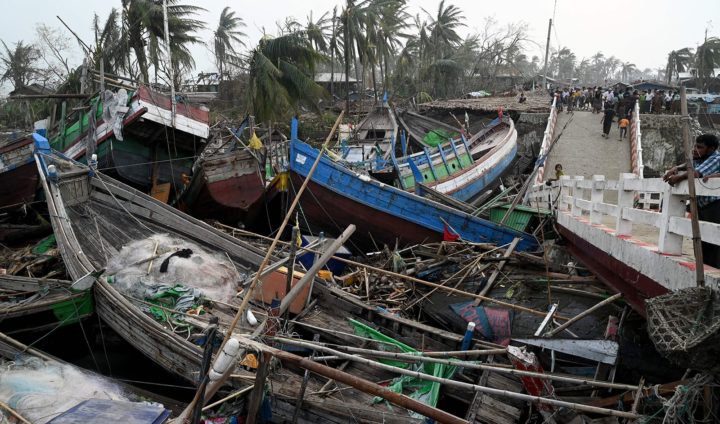Cyclone Mocha Claims Over 400 Lives in Myanmar’s Rakhine State
Myanmar’s Rakhine state has been devastated by Cyclone Mocha, resulting in the tragic loss of more than 400 lives, according to a report released on Wednesday by the Arakan Rohingya National Alliance (RNA), a rights group. The cyclone made landfall on Sunday, hitting the coast between Bangladesh’s Cox’s Bazar district and Myanmar’s Kyaukpyu township.
The RNA statement highlighted the extensive damage suffered by coastal villages in Rakhine’s capital, Sittwe. The majority of the victims were Muslims, and there are concerns that the death toll will continue to rise. Additionally, more than 10,000 homes were destroyed in the wake of the cyclone.
Cyclone Mocha stands as one of the most powerful storms ever recorded in the region, with the Joint Typhoon Warning Center reporting wind speeds exceeding 135 miles (217 kilometers) per hour at the time of landfall.
The situation in Sittwe is particularly dire, as approximately 130,000 Rohingya people have been confined to refugee camps, resembling concentration camps, since 2012. Sadly, most of them were not able to be evacuated in time. Nay San Lwin, co-founder of the Free Rohingya Coalition, revealed that one camp, housing 380 shelters, was completely wiped out by approximately 30 feet of flooding.
Though the death toll in all Sittwe camps is believed to be higher than the reported 400, it has been challenging to obtain an accurate figure due to the disruption of mobile and internet services in the area. Lwin further noted that 90% of structures in all the camps have been damaged.
According to the United Nations, the storm surge has reached heights of 9-9.5 feet in the low-lying areas of Arakan and the coasts of Bangladesh.
The impact of Cyclone Mocha on Sittwe has been catastrophic, with destruction extending to homes, shelters, schools, mosques, monasteries, clinics, and vital infrastructure. The towns of Ponnagyan, Kyauktaw, Mrauk-U, Myebon, Pauktaw, and Rathedaung were also affected by the cyclone’s wrath.
In the face of this disaster, the RNA statement strongly criticized the military regime for its inadequate efforts and mismanagement of cyclone-related disasters, resulting in the loss of countless lives.
The statement also emphasised the urgent need for drinking water, medicine, shelters, food, and essential supplies for the affected population. The international community and non-governmental organisations (NGOs) were urged to provide assistance. The RNA called upon the military regime to allow unhindered access to aid agencies and individual helpers, without discrimination of any kind, to reach all those in need.







